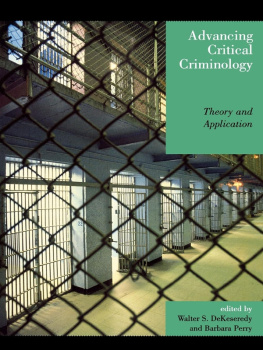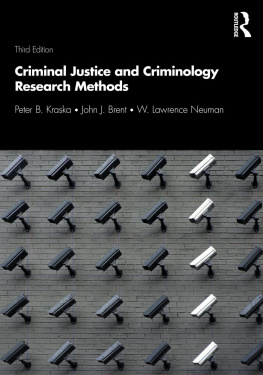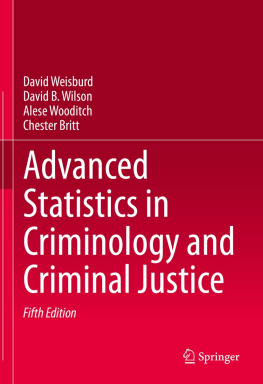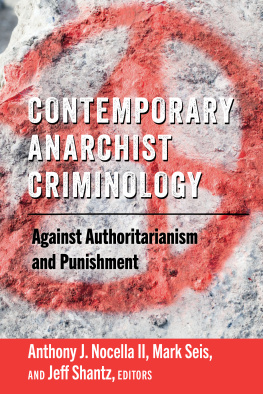Advancing Qualitative Methods in Criminology and Criminal Justice
For several decades qualitative research has been under-represented in criminological and criminal justice research. This collection is intended to promote the understanding of qualitative research designs and to encourage their use among those seeking answers to questions about crime and justice. To this end top qualitative scholars have been assembled to provide their insights on the topic. A wide range of expert contributors delve into topics such as, the state of qualitative methods in the discipline, the potential ethical and physical hazards of engaging in ethnographic research, how to make sense of and interpret participants stories, innovative ways to collect data, the value of using mixed methods to understand crime and justice issues, effective strategies for teaching fieldwork, and the inherent rewards of a career spent speaking with others. This book will be an ideal introduction for students and scholars of Criminal Justice, Criminology, and Sociology, regardless of whether their primary methodology is qualitative or quantitative.
This book was originally published as a special issue of the Journal of Criminal Justice Education.
Heith Copes is Associate Professor of Criminal Justice at the University of Alabama at Birmingham, USA. His research interests include criminal decision-making as it relates to various types of illegal behavior including drug distribution, automobile theft and identity theft. His research has been published in a variety of journals, including Social Problems, the British Journal of Criminology, Deviant Behavior and Justice Quarterly.
First published 2012
by Routledge
2 Park Square, Milton Park, Abingdon, Oxon OX14 4RN
Simultaneously published in the USA and Canada
by Routledge
711 Third Avenue, New York, NY 10017
Routledge is an imprint of the Taylor & Francis Group, an informa business
2012 Academy of Criminal Justice Sciences
This book is a reproduction of the Journal of Criminal Justice Education, Volume 21, Issue 4. The Publisher requests to those authors who may be citing this book to state, also, the bibliographical details of the special issue on which the book was based.
All rights reserved. No part of this book may be reprinted or reproduced or utilised in any form or by any electronic, mechanical, or other means, now known or hereafter invented, including photocopying and recording, or in any information storage or retrieval system, without permission in writing from the publishers.
Trademark notice: Product or corporate names may be trademarks or registered trademarks, and are used only for identification and explanation without intent to infringe.
British Library Cataloguing in Publication Data
A catalogue record for this book is available from the British Library
ISBN 13: 978-0-415-78311-8
Typeset in Helvetica
by Taylor & Francis Books
Disclaimer
The publisher would like to make readers aware that the chapters in this book are referred to as articles as they had been in the special issue. The publisher accepts responsibility for any inconsistencies that may have arisen in the course of preparing this volume for print.
Contents
Heith Copes
Richard Tewksbury, Dean A. Dabney and Heith Copes
John J. Brent and Peter B. Kraska
Lois Presser
Sveinung Sandberg
Thomas J. Holt
J. Mitchell Miller and Richard Tewksbury
Scott Jacques and Richard Wright
Robert G. Morris and James W. Marquart
Mark R. Pogrebin
John J. Brent is a doctoral student in the Sociology and Criminal Justice Department at the University of Delaware, USA. His current research interests include criminal justice theory, criminological trends of late-modernity, and the cultural contexts of crime. He is coauthor of Theorizing Criminal Justice: Eight Essential Orientations (2010) with Peter B. Kraska.
Heith Copes is an associate professor in the Department of Justice Sciences at the University of Alabama at Birmingham, USA. His research interests include qualitative methods, auto theft, and the intersections of criminal motivation and experiential aspects of the offending experience.
Dean A. Dabney is an associate professor in the Department of Criminal Justice at Georgia State University, USA. He received his doctorate in sociology from the University of Florida in 1997. His scholarly interests include the organizational culture within law enforcement agencies, forms of deviance and/or criminal behaviours that occur in organizational settings, and qualitative research methods.
Thomas J. Holt is an assistant professor in the School of Criminal Justice at Michigan State University, USA. His research focuses on cybercrime and the ways that technology and the Internet facilitate deviance. He has published in journals such as Crime and Delinquency, Deviant Behavior, and the Journal of Criminal Justice. He is also the editor of the book Crime On-line: Correlates, Causes, and Context, published by Carolina Academic Press
Scott Jacques is assistant professor of Criminal Justice at the University of Cincinnati, USA. In addition to his interest in theorizing criminological method, he also studies victimizations of and social control by drug dealers. His work has been published in journals such as Criminology, Crime & Delinquency, Journal of Research in Crime & Delinquency, and Justice Quarterly.
Peter B. Kraska is a professor and graduate program director in the Criminal Justice Department at Eastern Kentucky University, USA. His interests include mixed methods research, criminal justice theory, and various trends associated with late modernity, such as the military/criminal justice blur. His latest book is a comprehensive research methods text titled, Criminal Justice and Criminology Research Methods (Pearson).
James W. Marquart is the dean of the School of Economic, Political and Policy Sciences at the University of Texas-Dallas, USA, and a professor of criminology. He has long-term research and teaching interests in prison organizations, capital punishment, criminal justice policy, and research methods. His current research involves an analysis of the long-term effects (i.e., prison violence, racially motivated attacks, and gang-related violence) of the in-cell racial integration policies in the California and Texas prison systems.
J. Mitchell Miller is a professor in the Department of Criminal Justice at the University of Texas at San Antonio, USA. A former editor of the Journal of Crime & Justice and the Journal of Criminal Justice Education, he maintains a broad research agenda oriented around justice system program evaluation, criminological theory development, drugs and crime, and alternative fieldwork.
Robert G. Morris, Ph.D., is an assistant professor of criminology at the University of Texas at Dallas, USA. He studies the etiology of technology driven crime with a specific interest in fraud (crimes of trust) and cybercrime as well as contemporary issues in criminal justice, such as corrections administration and inmate misconduct. His recent work has appeared in Crime and Delinquency, Criminal Justice and Behavior, the Journal of Criminal Justice, Deviant Behavior






